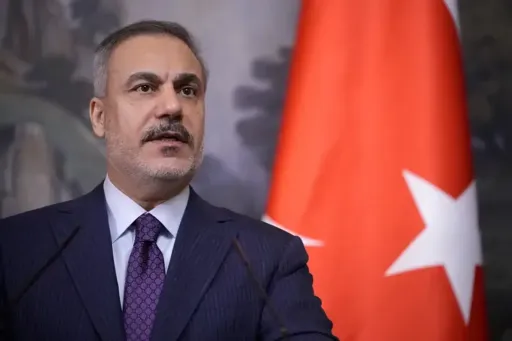Recent incidents and developments on Israel's genocide in Gaza have shown that the US may not wield as much influence over Israel's policies as commonly believed, and the reality could even be the opposite, Turkish Foreign Minister Hakan Fidan has said.
"As you know, there has been a long-standing reality in American domestic politics regarding who controls and manages whom. Recent events have shown that the US does not have as much influence over Israel’s policies as assumed; it may even be the opposite," Fidan said on Thursday, commenting on discussions continuing with US President Donald Trump regarding peace in Gaza and stability in Syria.
Stressing that Israel has always been a problem for the region since it seized Palestinian lands, Fidan said all regional countries support the two-state solution based on 1967 borders.
"However, Israel has never genuinely wanted a two-state solution. It has consistently pursued a policy of seizing Palestinian lands beyond the 1967 borders, using security as an excuse," Fidan said in an interview with MBC MASR TV channel.
"At this point, this has been the biggest problem for the Islamic world for decades. In recent years, Israeli expansionism has become an official threat to the region, besides the ongoing oppression in Palestine," he added.
Underlining the importance of the emergency Arab-Islamic summit in Doha, Fidan said the meeting highlighted Israel’s expansionism.
"We will continue to oppose and work against the ongoing genocide in Gaza and Israel’s attempts to annex the West Bank, and we will strive for the realisation of a Palestinian state. This is indispensable for regional peace," he added.

Israel exploiting weakness of neighbours
The top diplomat urged Israel's expansionist policies to be addressed by regional countries, and the global community, calling for appropriate measures in this regard.
"This is extremely important. It is neither good for Israel, nor for the countries of the region. Unfortunately, Israel draws its security from the political and economic weaknesses and technological backwardness of countries close to it," he added.
"For instance, its occupation in Lebanon, its presence in Syria, attacks against Iran, the continuous targeting of civilian areas in Yemen, systematic destruction of infrastructure, and most recently, the attack on Qatar."
Fidan said the recent Israeli attack on Hamas leadership in Doha "has changed many things, while mediation efforts are ongoing."
Pointing out the international actors' failure to resolve Israel's genocide in Gaza, the Russia-Ukraine war and other conflicts, Fidan said the current system shows tendency to "fuel crises rather than provide solutions."
Fidan said blocs, alliances and global bodies, particularly the EU and the UN, often fall short in addressing global problems.
"The structure of the United Nations, particularly the Security Council, seems inadequate in solving these issues. Reform of the Security Council and the UN as a whole is necessary," Fidan said, calling for more inclusive and participatory decision-making mechanism to be implemented.
"If such reforms do not happen, as you mentioned, it is inevitable that alternative regional actors will emerge — such as BRICS, the Shanghai Cooperation Organization, ASEAN, and many others not listed here — seeking different approaches."
Israel has been carrying out a genocide in Gaza since October 2023. Palestinians have recorded killings of more than 65,200 people, most of them women and children.
Some 11,000 Palestinians are feared buried under rubble of annihilated homes, according to Palestine's official WAFA news agency.
Experts, however, contend that the actual death toll significantly exceeds what the Gaza authorities have reported, estimating it could be around 200,000.





















